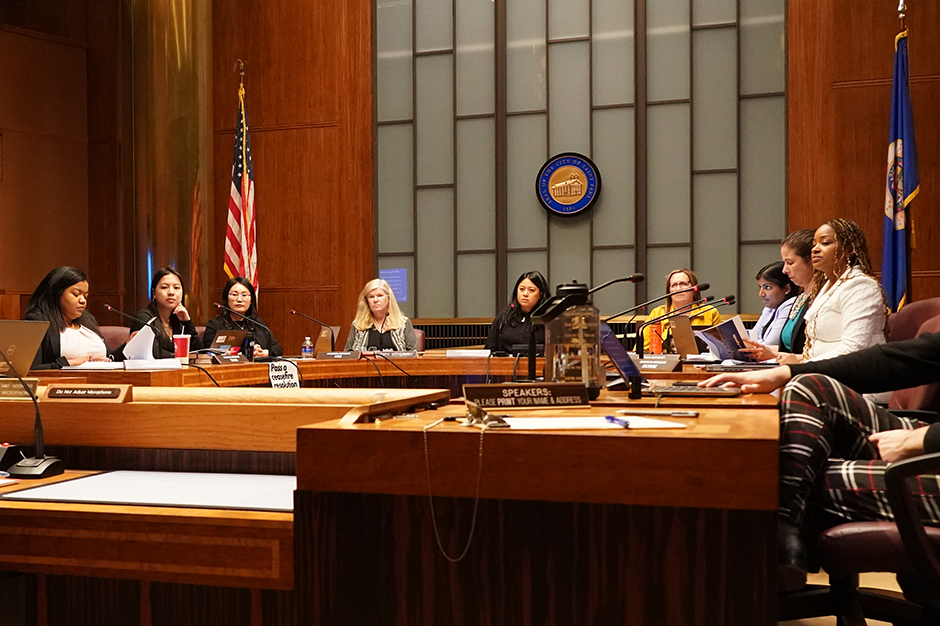Update: Mayor Melvin Carter announced Thursday afternoon that he line-item vetoed multiple parts of the council’s budget right before end of day Wednesday, including pulling $1.8 of renovation funds for city council offices and putting that money into funding police overtime. He also implemented a new hiring and contracting freeze he says is necessary to balance the budget.
About a $19 difference in property taxes per median homeowner in St. Paul sparked frustration between the City Council and mayor last week as both proposed 2025 budgets for the city.
The council adopted a budget that deviated in many ways from what was proposed in a compromise budget by the city’s mayor at its Dec. 11 meeting. Ultimately, the tax levy difference between the mayor’s compromise budget was about 1%, with the budget passed raising property taxes by 5.9% as opposed to the mayor’s proposed 6.9% increase – down from his original 7.9% proposal.
For the owner of a median-value $275,000 St. Paul home, the 5.9% levy increase amounts to an additional $98 per year in city property taxes. Additional increases will come when the school district, Ramsey County and Metropolitan Council pass their budgets.
During last week’s meeting, council members supporting the $415 million approved budget noted many times that they believe every penny counts for city residents. Ward 5 council member Hwa Jeong Kim said the council had “taken a scalpel over an axe” in crafting the budget that was passed.
“At a time when folks are literally pinching pennies together to make ends meet, I think it’s important then that the city finds pennies in the couch and that we are looking responsibly at sources of money and using more restrictive dollars for our programs, instead of asking taxpayers to foot the bill first,” Kim said.

The state deadline for cities to adopt a final budget was Wednesday and, unlike Minneapolis Mayor Jacob Frey, St. Paul Mayor Melvin Carter did not veto the council-passed budget.
That doesn’t mean Carter is happy about it, however.
In a statement, the mayor said the council’s action “saves median homeowners $19 per year by cutting millions in police staffing and other city services without a plan, reducing funding for streets and sidewalks, and eliminating two total positions — director of Human Rights and police property room clerk — while adding two new titles to the City Council’s staff.”
The impact of the $19-per-property cut will not become fully clear until the new year.
The largest cuts by the council targeted the city’s Police Department, including. a $1.2 million reduction to non-emergency police overtime. Instead, the council set aside $700,000 in contingency funds for police overtime, which can only be accessed if the department issues quarterly reports about how it’s spending those overtime dollars.

In a meeting held with members of the local news media before the council vote, Carter said his compromise proposal to the council was meant to “prevent major disruptions to city departments” including “first and foremost” police and fire, along with other departments that rely heavily on the city’s general fund such as parks and recreation and libraries.
The mayor said police overtime is used primarily because the city is short 67 officers. He said overtime dollars also, in part, contribute to the city’s higher-than-average homicide clearance rate, which is 80%, according to the department.
Four St. Paul council members are new to their roles and finishing their first year in office. Carter noted this and said, as a former council member, he saw this year’s council approaching the budget process in a way unlike any council before. He expressed frustration with reductions in funds he described as “unspecified,” meaning the council has not made it clear what the intended impact of those cuts will be.
Council President Mitra Jalali was the sole vote against the council-passed budget. Jalali noted that the council and administration had gone through a tough public negotiation process “because there’s so much distance between where our council wants to be and where the administration wants to be”
“I’ve worked really hard to hold that conflict,” she said. “There has to be a balance, for me, between funding important services and having capacity to respond to unknowns and bringing the property tax down. And, there are decisions made in this proposal that I have concerns about in the name of bringing the levy down, and I just worry that the tradeoffs aren’t worth it.”

In a news release following the passage of its budget, the council said the Police Department overspent its overtime budget by $3 million over the past three years and is projected to overspend its current budget by $5 million this year alone. This is why the contingency fund was created with a goal to “create more transparency around overtime spending.”
“The Council is committed to working with the Administration and the department to improve overtime spending reporting,” the release reads. “More precise data on activities that contribute to police overtime will help curb future overspending. At the same time, the city continues to support hiring strategies that increase the number of new officers and reduce overtime reliance.”

Winter Keefer
Winter Keefer is MinnPost’s Metro reporter. Follow her on Twitter or email her at wkeefer@minnpost.com.





